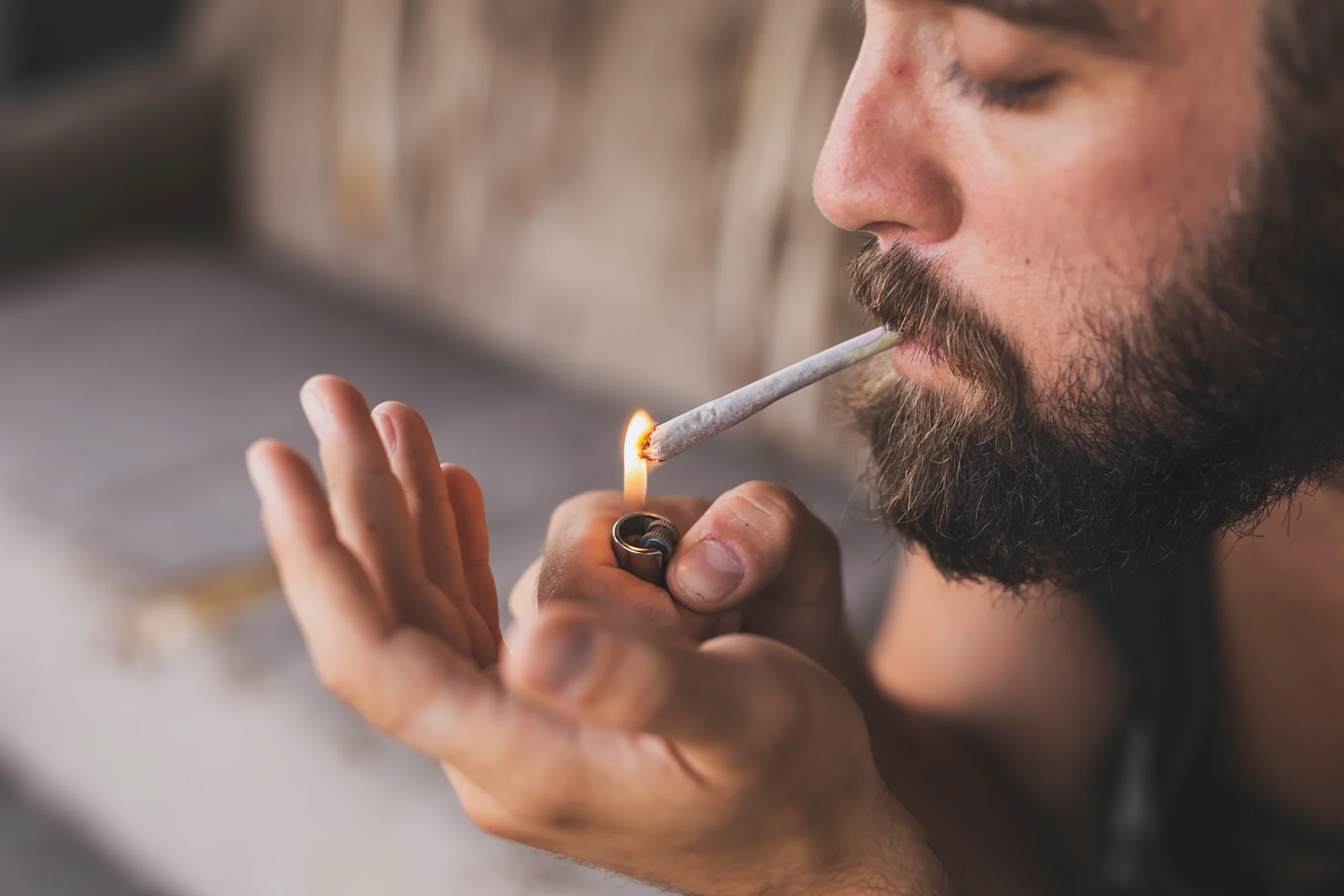Drug and Alcohol
Is Marijuana Addictive?

Is Marijuana Addictive? Learn the signs of marijuana dependence, its potential risks, and how to get practical help for recovery and long-term wellness.
What happens in therapy for marijuana addiction?
Therapy for marijuana addiction helps identify triggers and develop healthier coping strategies. Cognitive-behavioral therapy (CBT) is often used to alter negative thought patterns and behaviors related to marijuana use. It also teaches problem-solving skills, emotional regulation, and relapse prevention techniques to support recovery.
Is marijuana withdrawal dangerous?
Marijuana withdrawal is generally not dangerous but can be uncomfortable. Common symptoms include irritability, mood swings, anxiety, and sleep disturbances. While not life-threatening, withdrawal can be distressing, and professional support can help manage symptoms and ease the recovery process.
Can I quit marijuana cold turkey?
Quitting marijuana cold turkey is possible but challenging. The withdrawal symptoms, such as cravings, anxiety, and sleep issues, can be intense. Gradually reducing use or seeking professional support can make the process more manageable, providing guidance and coping strategies for successful cessation.
How effective are rehabilitation programs for marijuana addiction?
Rehabilitation programs are highly effective in treating marijuana addiction. They provide structured support, therapy, and a sense of community. Inpatient or outpatient programs offer therapy, education on addiction, relapse prevention, and holistic approaches, increasing the likelihood of long-term recovery and personal growth.
What role does family play in addiction recovery?
Family plays a crucial role in addiction recovery by offering emotional support, understanding, and encouragement. Family therapy helps rebuild relationships, educate family members about addiction, and promote a positive home environment. Strong family involvement can boost motivation and improve treatment outcomes during recovery.
Is marijuana addictive? The question "Is Marijuana Addictive?" often arises in discussions about mental health and substance use. Many view marijuana as harmless, but for some, it can lead to dependency, disrupting mental well-being, relationships, and daily responsibilities. This growing problem can feel overwhelming and isolating.
Fortunately, recovery is possible. At The Edge Treatment Center, we understand how addiction and mental health challenges are deeply connected. We offer personalized treatment plans that support long-term healing and a healthier, addiction-free life. This article explores the risks and addictive potential of marijuana, along with practical strategies to manage and overcome addiction.
Understanding Marijuana
Marijuana, also known as cannabis, is derived from the Cannabis plant and has a long history of use across many cultures, dating back thousands of years. Traditionally, it has been used for medicinal, spiritual, and recreational purposes.
The plant contains more than 100 unique compounds known as cannabinoids. The most prominent and psychoactive cannabinoid is Tetrahydrocannabinol (THC), responsible for the euphoria or "high" that users experience.
THC binds to cannabinoid receptors in the brain, primarily in areas responsible for pleasure, memory, thinking, coordination, and time perception. This interaction yields a range of psychological and physiological effects, some of which are beneficial for users, while others may lead to complications.
Common Uses of Marijuana
Recreational Use: Marijuana is widely used recreationally to induce feelings of relaxation, euphoria, and altered sensory perception. For many, it is a social activity or a personal escape from stress.
Medical Use: In various regions, marijuana is legally prescribed to treat health conditions such as chronic pain, epilepsy, multiple sclerosis, and nausea related to chemotherapy. Medical marijuana is often administered in controlled doses to maximize therapeutic benefits while minimizing potential side effects.
Effects on the Mind and Body
The effects of marijuana can vary depending on the strain, dose, and individual response. Some users experience calmness, an enhanced appetite (often referred to as "the munchies"), and increased sensory awareness.
However, it can also result in adverse reactions such as anxiety, paranoia, impaired coordination, and reduced judgment. Long-term or heavy use may increase the risk of cognitive decline and mental health issues.
Is Marijuana Addictive?
The notion that marijuana is non-addictive is increasingly challenged by scientific research. While it may not be as physically addictive as substances like opioids or alcohol, marijuana can still lead to a condition known as Cannabis Use Disorder (CUD).
Regular exposure to THC affects the brain's reward system, diminishing natural dopamine levels and reinforcing the desire for continued use.
Studies show that approximately 9% of users develop a dependency on marijuana. This figure increases to about 17% among those who start using during adolescence and up to 25–50% among daily users. These statistics underscore the importance of recognizing marijuana addiction as a real and complex issue.
Symptoms of Marijuana Dependence

Recognizing the signs of marijuana dependence can help in seeking timely support. Common symptoms include:
Withdrawal Symptoms: When not using marijuana, individuals may experience irritability, mood changes, anxiety, restlessness, and disturbances in sleep and appetite.
Increased Tolerance: Repeated use often leads to needing larger amounts of the substance to achieve the same effects.
Behavioral Signs: Users may spend excessive time using or obtaining marijuana, repeatedly fail to cut back despite wanting to, and neglect responsibilities at work, school, or home.
Factors Contributing to Addiction
Marijuana addiction results from a combination of genetic, psychological, and environmental factors:
Genetic Influences: A family history of substance abuse may increase vulnerability to developing cannabis use disorder.
Psychological Factors: Stress, unresolved trauma, anxiety, depression, and other mental health disorders can lead individuals to self-medicate with marijuana.
Environmental Triggers: Social pressure, easy access to marijuana, and cultural acceptance of cannabis use significantly influence the likelihood of addiction.
Signs and Symptoms of Marijuana Addiction
Identifying marijuana addiction involves observing changes across physical, behavioral, and psychological domains:
Physical Symptoms:
Bloodshot or red eyes
Increased appetite
Irregular sleep patterns (insomnia or excessive sleep)
Persistent coughing or lung issues
Decline in personal hygiene
Behavioral Symptoms:
Ignoring personal or professional responsibilities
Lack of motivation or ambition (sometimes called "a motivational syndrome")
Social withdrawal or reduced interaction with friends and family
Spending excessive time using marijuana
Financial difficulties due to drug purchases
Psychological Symptoms:
Persistent anxiety or paranoia
Irritability and agitation, especially during periods of abstinence
Mood swings and emotional instability
Depression or hopelessness is linked to prolonged use
Impacts of Marijuana Use
Marijuana use affects multiple aspects of a person’s life, ranging from health to interpersonal relationships.
Mental Health Impacts:
Heightened risk of anxiety and depression, especially with chronic use
Impaired short-term memory and attention span
Reduced ability to process complex tasks or information
Potential for psychotic episodes in predisposed individuals
Decline in motivation, affecting education or career advancement
Physical Health Effects:
Respiratory problems from smoking, such as chronic bronchitis
Elevated heart rate poses risks for individuals with heart conditions
Compromised immune system responses
Disruptions in appetite regulation and potential for weight fluctuation
Impaired motor skills, increasing accident risk
Social and Behavioral Impacts:
Isolation from family and friends
Decline in academic or workplace performance
Legal consequences in areas where marijuana is not legalized
Engagement in high-risk behaviors due to impaired judgment
Alteration of daily routines and priorities, often centering around drug use
Risk Factors for Marijuana Addiction
Understanding the risk factors helps in prevention and early intervention:
Genetic Factors: A predisposition to addiction can be inherited through family history, influencing how the brain responds to THC.
Environmental Influences: Peer influence, easy availability, and a permissive cultural attitude toward marijuana significantly raise addiction risk.
Psychological Conditions: Mental health disorders such as depression, anxiety, PTSD, and other co-occurring conditions increase vulnerability to marijuana misuse.

We’re Here To Help You Find Your Way
Would you like more information about marijuana? Reach out today.
How to Seek Help for Marijuana Addiction
Acknowledging the need for help is a pivotal step in recovery:
Recognize the Need: Reflect on how marijuana use is affecting your relationships, responsibilities, and mental well-being.
Seek Professional Guidance: A medical or addiction specialist can help diagnose cannabis use disorder and recommend appropriate treatment.
Treatment Options:
Therapy: Cognitive-behavioral therapy (CBT) and other counseling approaches are effective for identifying and altering thought patterns that contribute to addiction.
Rehabilitation Programs: Inpatient and outpatient rehab facilities offer structured environments and support systems for recovery.
Holistic Approaches: Practices like yoga, meditation, nutritional support, and physical activity enhance emotional regulation and reduce relapse.
Medication: Though not always necessary, medications may be used to manage withdrawal symptoms or underlying mental health conditions.
Choosing the Right Facility:
Research various treatment centers.
Ensure the program fits your personal and medical needs.
Check for appropriate accreditation and qualified staff.
Evaluate the environment to ensure it fosters healing and support.
Support Networks:
Recovery is more sustainable when supported by others. Consider:
Joining support groups like Marijuana Anonymous (MA)
Participating in community-based counseling and outreach programs
Leaning on trusted friends and family
Utilizing online forums for guidance and peer connection
The Edge Treatment Center: Your Partner in Recovery
At The Edge Treatment Center, we understand the challenges of marijuana addiction and provide tailored recovery plans rooted in compassion and clinical expertise. Our multidisciplinary team works with each client to build a plan that addresses the physical, psychological, and social aspects of addiction.
Our Services Include:
Personalized one-on-one counseling sessions
Group therapy fosters shared growth and understanding
In-depth assessments for effective treatment planning
Holistic therapies, including mindfulness, wellness coaching, and fitness
A strong peer support network to promote accountability and long-term success
By emphasizing individualized care, evidence-based methods, and holistic wellness, The Edge Treatment Center is committed to helping individuals achieve lasting sobriety and rebuild a fulfilling, healthy life.

We’ll Lead You to New Heights
Do you have more questions about marijuana? Reach out.
Marijuana Taking Over Your Life? We'll Help You Take It Back.
Embracing the journey to recovery can be daunting, but it's vital to remember that seeking help is a sign of strength, not weakness. The first step involves acknowledging the need for change and reaching for support.
Whether you're exploring treatment options or contemplating joining a support group, know that each move forward is a testament to your courage and commitment to a healthier future. Contact The Edge Treatment Center to begin your journey to lasting recovery.

We’re Here To Help You Find Your Way
If you or a loved one is struggling with addiction, there is hope. Our team can guide you on your journey to recovery. Call us today.
Written by
The Edge Treatment Center
Reviewed by
 Jeremy Arzt
Jeremy ArztChief Clinical Officer
Drug and Alcohol
July 4, 2025
